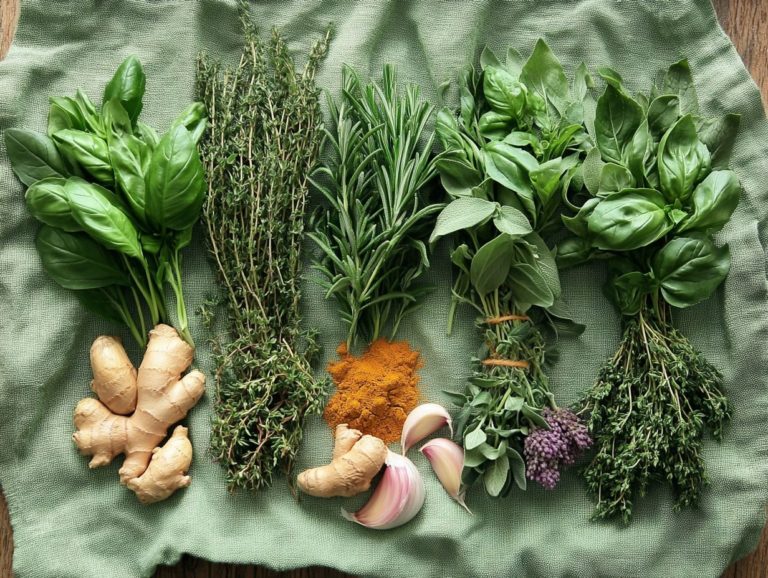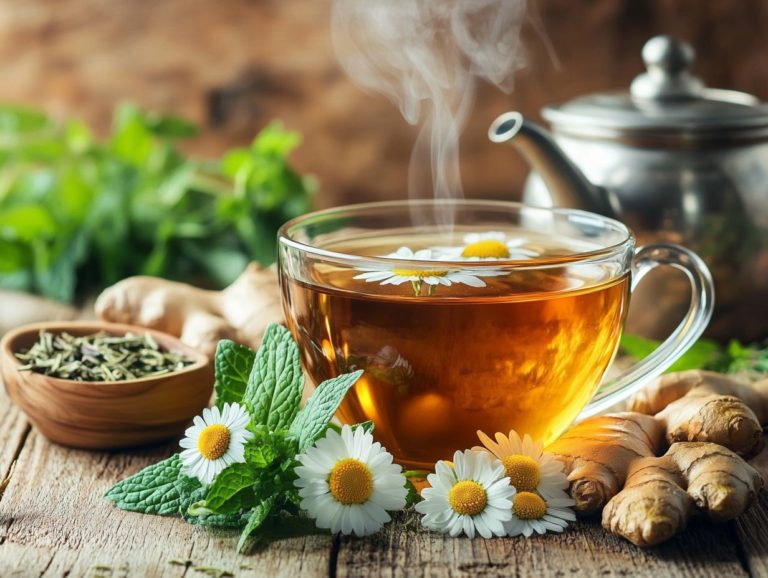The Benefits of Dandelion in Your Diet
Dandelions often face unjust criticism, labeled as mere pesky weeds. However, these vibrant yellow flowers hold an impressive wealth of nutritional benefits that can truly enhance your health.
Discover the amazing benefits of this incredible plant now! Dandelions offer remarkable advantages, from their abundant vitamins and minerals to compelling health benefits backed by recent research.
You ll find a variety of creative ways to incorporate dandelions into your meals, while also keeping an eye out for any potential side effects.
Contents
- Key Takeaways:
- Nutritional Benefits of Dandelion
- Health Benefits of Dandelion
- Incorporating Dandelion into Your Diet
- Potential Side Effects and Risks
- Frequently Asked Questions
- What is dandelion? Why should we include it in our diet?
- What are some of the key nutrients found in dandelion?
- How does dandelion support digestion?
- Can dandelion help with weight loss?
- What are some other potential benefits of including dandelion in our diet?
- How can we incorporate dandelion into our diet?
Key Takeaways:
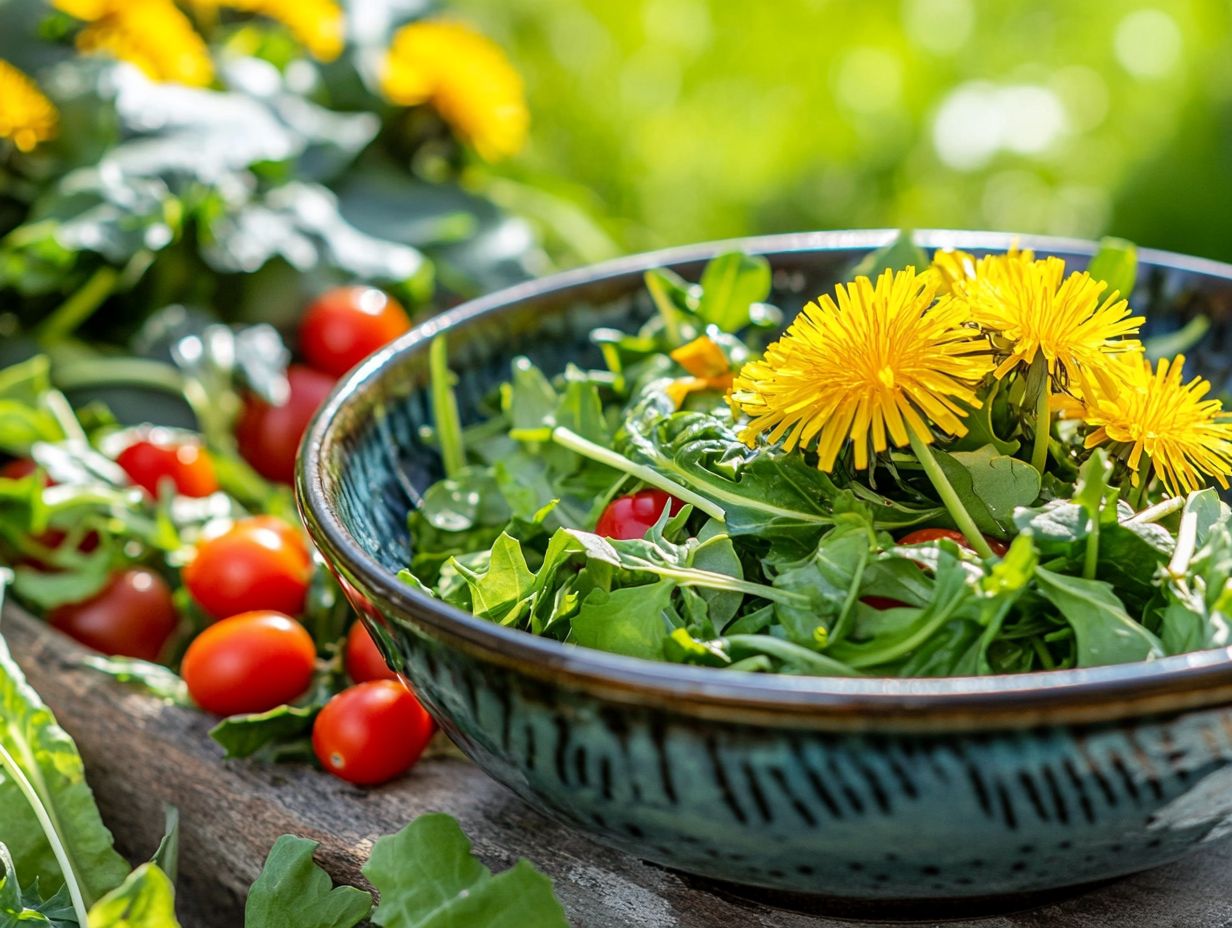
- Dandelion is rich in vitamins A, C, and K, plus iron and calcium.
- It may improve digestion, reduce inflammation, and support liver health.
- Versatile uses include salads and herbal teas.
What is Dandelion?
Dandelion, scientifically known as Taraxacum officinale, is a remarkable plant appreciated for its culinary and medicinal uses. Commonly found in fields and gardens, this leafy vegetable is far from just a weed.
The entire plant is edible, offering a range of possibilities from fresh greens in salads to herbal teas with numerous health benefits. Understanding the many facets of dandelion is essential for those exploring natural remedies and healthy living.
This hardy perennial showcases a unique growth habit, with a rosette of deeply lobed leaves and striking flower heads that rise on slender stalks, heralding spring. Dandelion has been celebrated across cultures not only for its charm but also for its nutritional richness, packed with vitamins A, C, and K, along with important minerals like iron and calcium.
In herbal traditions, dandelion root is recognized for its detoxifying properties and potential liver health benefits. Many cuisines incorporate dandelion in various dishes its young leaves shine in salads, while dried roots serve as a delightful caffeine-free coffee alternative.
With its impressive nutritional profile, dandelion embodies a spirit of resourcefulness and nature’s bounty.
Nutritional Benefits of Dandelion
Dandelion is a gem in the world of nutrition, celebrated for its remarkable nutritional value. You’ll find it packed with essential vitamins and minerals that significantly enhance your overall health.
The leaves, commonly referred to as dandelion greens, boast an impressive array of dietary fiber, potassium, vitamin A, and vitamin C. Incorporating these greens into your diet supports your gut health and maintains multiple bodily functions.
Key Vitamins and Minerals
Dandelion is a treasure trove of essential vitamins and minerals. Vitamin A, vitamin C, and potassium each contribute significantly to its remarkable health benefits.
These nutrients are vital for numerous bodily functions, from bolstering your immune system to enhancing your skin’s radiance and promoting smooth digestion. The antioxidants present in dandelion also help combat damage caused by harmful molecules in the body, making it a formidable ally against chronic diseases.
Vitamin A is essential for maintaining healthy vision and immune defenses, while vitamin C boosts collagen production, giving your skin a youthful glow and enhancing its elasticity. Potassium is pivotal for heart health and regulating blood pressure.
Dandelion is also packed with antioxidants, such as carotenoids and flavonoids, which work together to neutralize harmful free radicals. This synergistic effect elevates your overall well-being and positions dandelion as an exceptional choice among dietary supplements for anyone eager to add more natural health boosters to their routine.
Health Benefits of Dandelion
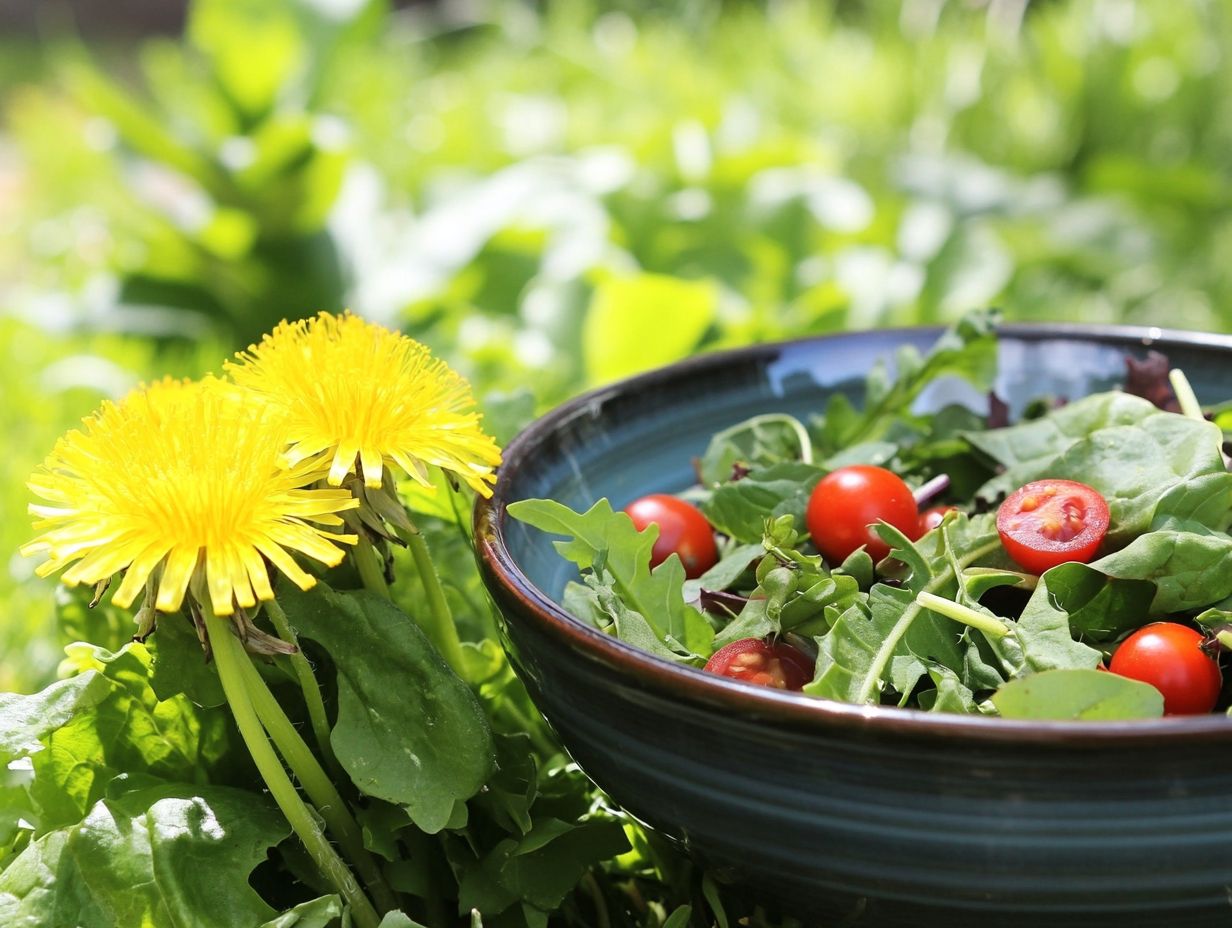
The health benefits of dandelion reach well beyond its impressive nutritional profile. It is celebrated for its ability to support various bodily functions and address a range of health issues.
Dandelion can aid in managing blood pressure and cholesterol levels. This makes it a vital addition to a heart-healthy diet.
Its anti-inflammatory qualities can help reduce inflammation and solidify its status as a natural remedy for chronic diseases.
Supporting Research and Evidence
Many studies and expert opinions, including those from the Cleveland Clinic and nutritionist Nancy Geib, support the health claims surrounding dandelion. Research has highlighted its antioxidant properties, which play a crucial role in combating oxidative stress and reducing the risk of chronic diseases.
These findings elevate dandelion from a herbal remedy to a legitimate health-promoting powerhouse.
The exploration of dandelion’s benefits is ongoing, revealing its potential to enhance liver function and support digestive health. A study published in the Journal of Ethnopharmacology discovered that dandelion extracts could significantly boost liver enzyme activity, potentially offering protection against liver damage.
Dandelion has also been associated with improved cholesterol levels, a claim supported by a study in the Journal of Medicinal Food, which highlighted its ability to reduce LDL cholesterol.
Such compelling evidence underscores its effectiveness in promoting overall well-being and emphasizes the importance of incorporating this versatile plant into your daily nutrition.
Incorporating Dandelion into Your Diet
Incorporating dandelion into your diet is not only simple; it opens the door to a wide range of culinary possibilities that enhance both flavor and nutrition.
Whether you’re adding fresh leaves to a salad or preparing them in a relaxing herbal tea, dandelion comes in various delicious forms, making it a versatile food in any health-conscious kitchen.
You can experiment with different cooking methods to maximize its health benefits. Saut ing or blending it into smoothies are just a couple of creative ways to enjoy this nutrient-rich plant.
Creative Ways to Use Dandelion
There are countless creative ways to incorporate dandelion into your meals, whether you re brewing a fragrant herbal tea or adding dandelion greens to salads and side dishes.
These versatile leaves not only bring a unique flavor to your dishes but also elevate their nutritional value, making them a superb choice for anyone looking to manage weight or boost their dietary fiber intake.
Dandelions are a treasure trove of vitamins A, C, and K, along with essential minerals, transforming them into a powerhouse of nutrition. As a home cook, you can delight in experimenting with these greens by saut ing them with garlic and olive oil for a delicious side or tossing them into smoothies for an extra nutrient kick.
Using dandelion root as a coffee substitute or infusion presents an excellent opportunity to enjoy its health benefits. By embracing this humble plant in your everyday meals, you can cultivate a more wholesome diet, opening the door to new flavors while reaping the many health rewards it has to offer.
Potential Side Effects and Risks
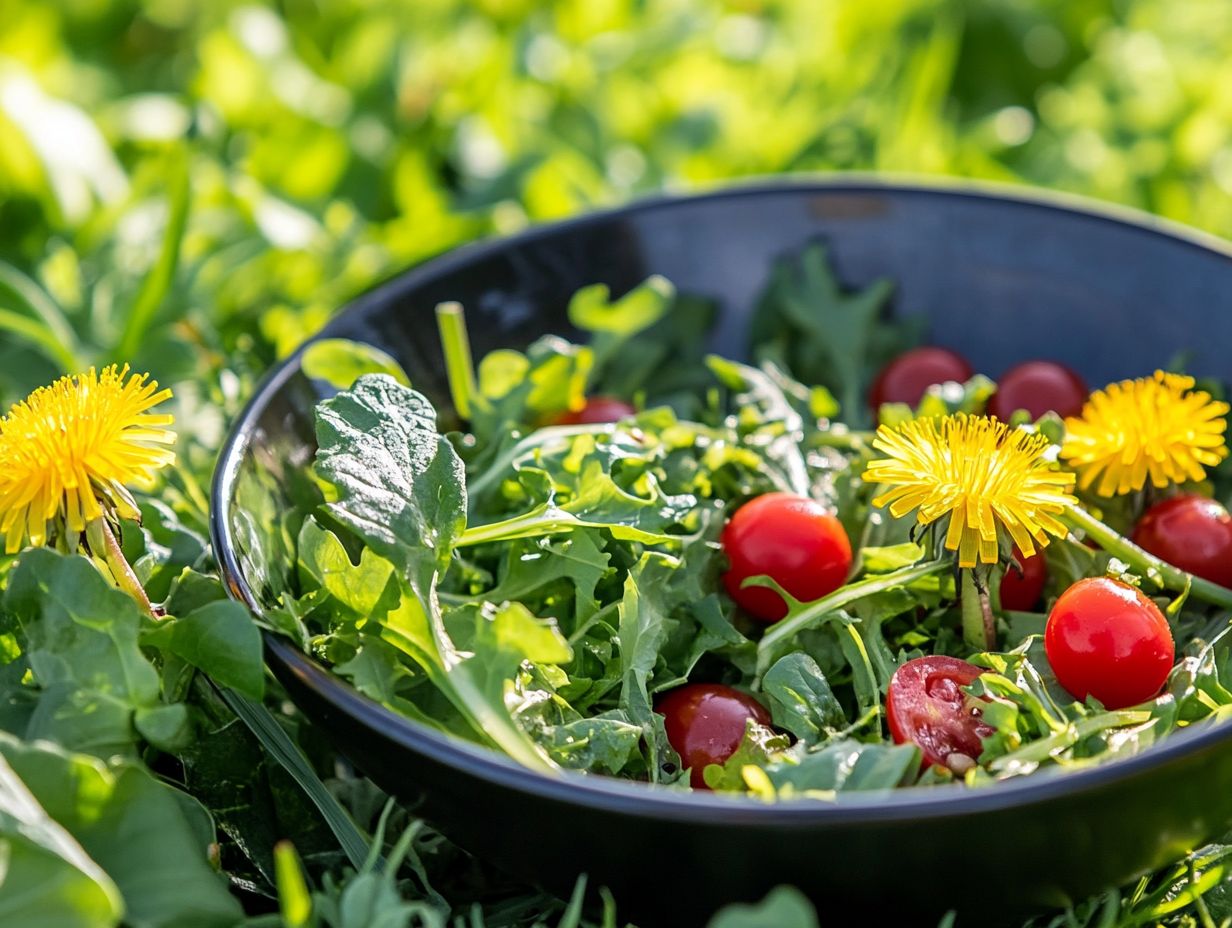
While dandelion is usually considered safe for most people, it s important to be aware of the potential side effects and health risks that come with its consumption.
As a natural diuretic, dandelion can lead to increased urination. If you have kidney issues or allergies, you should proceed with caution.
Understanding the precautions and warnings associated with dandelion is essential for ensuring its safe incorporation into your dietary practices.
Precautions and Warnings
Consider dandelion as an herbal remedy or supplement. Take precautions, especially regarding allergies and interactions with medications.
If you have known allergies to related plants, always consult a healthcare professional before using dandelion to avoid adverse reactions.
For those on prescription medications, especially diuretics or blood thinners, be cautious. Dandelion can affect how these medications work.
Individuals with health conditions like kidney disorders or diabetes should discuss their plans with a healthcare provider. Dandelion may alter blood sugar levels and exhibit diuretic effects.
Maintaining open communication with a healthcare professional ensures that incorporating this herbal supplement into your diet is safe and effective.
Frequently Asked Questions
What is dandelion? Why should we include it in our diet?
Dandelion is a flowering plant that grows worldwide. It has been used for centuries in traditional medicine and is believed to offer numerous health benefits due to its rich nutrient content.
What are some of the key nutrients found in dandelion?
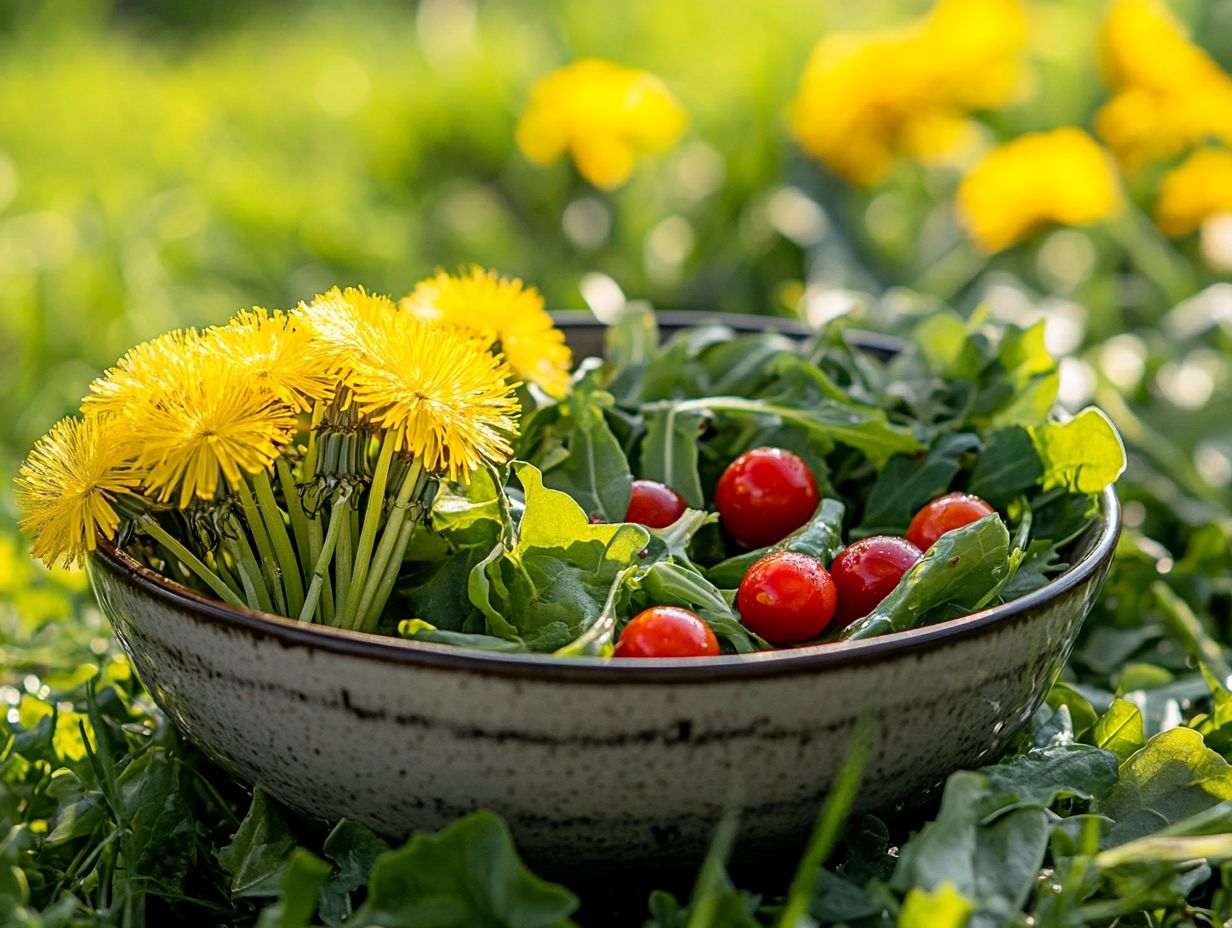
Dandelion is packed with vitamins A, C, and K. It also has iron, calcium, potassium, fiber, and antioxidants that contribute to its health benefits.
How does dandelion support digestion?
Dandelion supports digestive health. It contains inulin, a fiber that helps beneficial bacteria in the gut, improving digestion and reducing bloating.
Can dandelion help with weight loss?
No single food causes weight loss, but dandelion can support your efforts. It’s low in calories and high in fiber, helping you feel full for longer.
What are some other potential benefits of including dandelion in our diet?
Besides aiding digestion and weight loss, dandelion may support liver and kidney function, reduce inflammation, and boost the immune system.
How can we incorporate dandelion into our diet?
You can enjoy dandelion in many ways. Add leaves to salads, brew the roots for tea, or make jelly from the flowers.
However, always consult a healthcare professional before adding dandelion to your diet, especially if you are pregnant, breastfeeding, or taking any medications.

